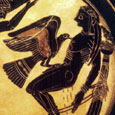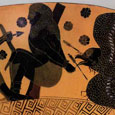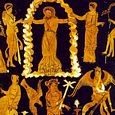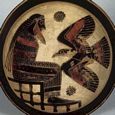AETOS KAUKASIOS
Greek Name
Αετος Καυκασιος
Transliteration
Aetos Kaukasios
Latin Name
Aquila Caucasium
Translation
Caucasian Eagle
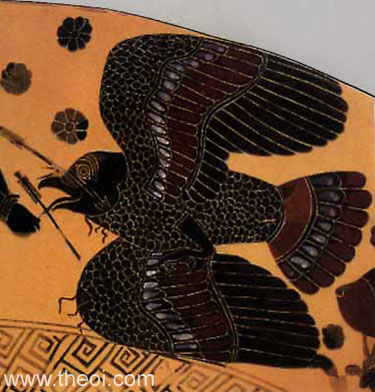
THE AETOS KAUKASIOS (Caucasian Eagle) was a gigantic eagle sent by Zeus to feed upon the ever-regenerating liver of the Titan Prometheus after he was chained to a peak of the Kaukasos (Caucasus) Mountains as punishment for stealing fire from the gods.
The eagle was variously described as a bronze automaton constructed by the god Hephaistos (Hephaestus), or as a fell creature spawned by the drakaina Ekhidna (Echidna).
When Herakles set out to free Prometheus from his bonds, he felled the eagle with a volley of arrows. Afterwards the Eagle, as well as the Titan and Arrow, were placed all amongst the stars as the constellations Aquila, the Kneeler and Saggita.
FAMILY OF THE EAGLE
PARENTS
[1] TYPHOEUS & EKHIDNA (Apollodorus 2.120, Hyginus Astronomica 2.1)
[2] TARTAROS & GAIA (Hyginus Astronomica 2.1)
[3] Constructed by HEPHAISTOS (Hyginus
Astronomica 2.1)
ENCYCLOPEDIA
CAUCASIAN EAGLE. Prometheus was put in chains, and fastened to a pillar, where an eagle sent by Zeus consumed in the daytime his liver, which, in every succeeding night, was restored again. Prometheus was thus exposed to perpetual torture, but Heracles killed the eagle and delivered the sufferer, with the consent of Zeus, who thus had an opportunity of allowing his son to gain immortal fame (Hes. Theog. 521, &c., Op. et Dies, 47, &c. ; Hygin. Poet. Astr. ii. 15; Apollod. ii. 5. § 11).
Source: Dictionary of Greek and Roman Biography and Mythology.
CLASSICAL LITERATURE QUOTES
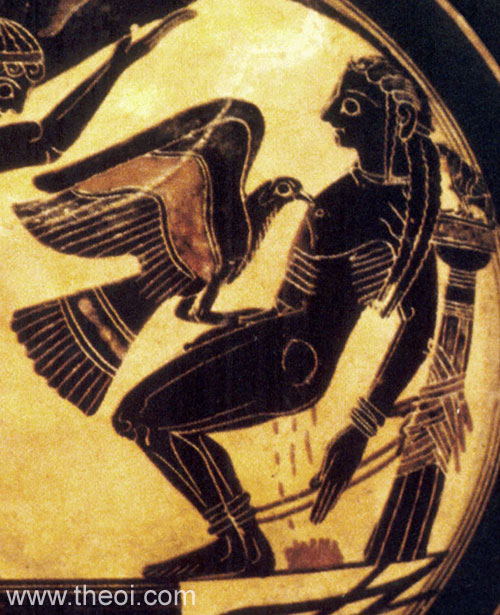
Hesiod, Theogony 507 ff (trans. Evelyn-White) (Greek epic C8th or C7th B.C.)
:
"Ready-witted Prometheus he [Zeus] bound with inextricable bonds, cruel chains, and drove a shaft through
his middle, and set on him a long-winged eagle, which used to eat his immortal liver; but by night the liver
grew as much again everyway as the long-winged bird devoured in the whole day. That bird Herakles (Heracles),
the valiant son of shapely-ankled Alkmene (Alcmena), slew; and delivered the son of Iapetos from the cruel
plague, and released him from his affliction--not without the will of Olympian Zeus who reigns on high, that the
glory of Herakles the Theban-born might be yet greater than it was before over the plenteous earth."
Aeschylus, Prometheus Bound 115 ff (trans. Weir Smyth) (Greek tragedy C5th B.C.)
:
"[Prometheus speaks after being chained to a crag in the Kaukasos (Caucasus) mountains :] ‘Ha!
Behold! What murmur, what scent wings to me, its source invisible, heavenly or human, or both? . . . Ha! What's
this? What may be this rustling stir of birds I hear again nearby? The air whirs with the light rush of wings.
Whatever approaches causes me alarm [i.e. he thinks it is the sound of the Eagle which will be sent to feed on
his liver].’"
Aeschylus, Prometheus Bound 1021 ff :
"[Hermes addresses Prometheus after his chaining :] ‘The winged hound of Zeus, the ravening eagle,
coming an unbidden banqueter the whole day long, with savage appetite shall tear your body piecemeal into great
rents and feast his fill upon your liver until it is black with gnawing.’"
Aeschylus, Prometheus Unbound (lost play) :
In Aeschylus' lost play Prometheus Unbound the Titan Prometheus is freed from his bonds by
Herakles who slays the tormenting Eagle with an arrow.
Aeschylus, Fragment 107 Prometheus Unbound (from Cicero, Tusculan Disputations 2. 10.
23-25) (trans. Weir Smyth) (Greek tragedy C5th B.C.) :
"[Prometheus laments :] ‘Behold me fettered, clamped to these rough rocks . . . Thus hath
Zeus, the son of Kronos (Cronus), fastened me, and to the will of Zeus hath Hephaistos (Hephaestus) lent his
hand. With cruel art hath he riven my limbs by driving in these bolts. Ah, unhappy that I am! By his skill
transfixed, I tenant this stronghold of the Erinyes (Furies). And now, each third woeful day, with dreadful
swoop, the minister of Zeus with his hooked talons rends me asunder by his cruel repast. Then, crammed and
glutted to the full on my fat liver, the utters a prodigious scream and, soaring aloft, with winged tail fawns
upon my gore. But when my gnawed liver swells, renewed in growth, greedily doth he return anew to his fell
repast. Thus do I feed this guardian of my awful torture, who mutilates me living with never-ending pain. For
fettered, as ye see, by the bonds of Zeus, I have no power to drive from my vitals the accursed bird. Thus,
robbed of self-defence, I endure woes fraught with torment : longing for death, I look around for an ending of
my misery; but by the doom of Zeus I am thrust far from death. And this my ancient dolorous agony, intensified
by the dreadful centuries, is fastened upon my body, from which there fall, melted by the blazing sun, drops
that unceasingly pour upon the rocks of Kaukasos (Caucasus).’"
Aeschylus, Fragment 113 Prometheus Unbound (from Plutarch, On Love 14. 757E) :
"[Herakles prays as he takes aim with his bow against the eagle tormenting Prometheus :] ‘May
Hunter Apollon speed my arrow straight!’"
Pseudo-Apollodorus, Bibliotheca 1. 45 (trans. Aldrich) (Greek mythographer C2nd A.D.)
:
"He [Zeus] ordered Hephaistos (Hephaestus) to rivet the body of Prometheus to Mount Kaukasos (Caucasus), a
Skythian (Scythian) mountain, where he was kept fastened and bound for many years. Each day an Eagle would fly
to him and munch on the lobes of his liver, which would then grow back at night."
Pseudo-Apollodorus, Bibliotheca 2. 120 :
"When he [Herakles] reached the mainland on the other side he killed with an arrow the Eagle on the
Kaukasos (Caucasus), the product of Ekhidna (Echidna) and Typhon that had been eating the liver of
Prometheus."
Apollonius Rhodius, Argonautica 2. 1238 ff (trans. Rieu) (Greek epic C3rd B.C.)
:
"And now the last recess of the Black Sea opened up and they [the Argonauts] caught sight of the high crags
of the Kaukasos (Caucasus), where Prometheus stood chained by every limb to the hard rock with fetters of
bronze, and fed an Eagle on his liver. The bird kept eagerly returning to its feed. They saw it in the afternoon
flying high above the ship with a strident whirr. It was near the clouds, yet it made all their canvas quiver to
its wings as it beat by. For its form was not that of an ordinary bird : the long quill-feathers of each wing
rose and fell like a bank of polished oars. Soon after the Eagle had passed, they heard Prometheus shriek in
agony as it pecked at his liver. The air rang with his screams till at length they saw the flesh-devouring bird
fly back from the mountain by the same way as it came."
Apollonius Rhodius, Argonautica 3. 844 ff :
"It [a magical herb] first appeared in a plant that sprang from the blood-like ichor of Prometheus in his
torment, which the flesh-eating Eagle had dropped on the spurs of Kaukasos (Caucasus)."
Callimachus, Fragment 551 (trans. Trypanis) (Greek poet C3rd B.C.) :
"And him [the Eagle] who devoured the liver of the protector of mankind [Prometheus]."
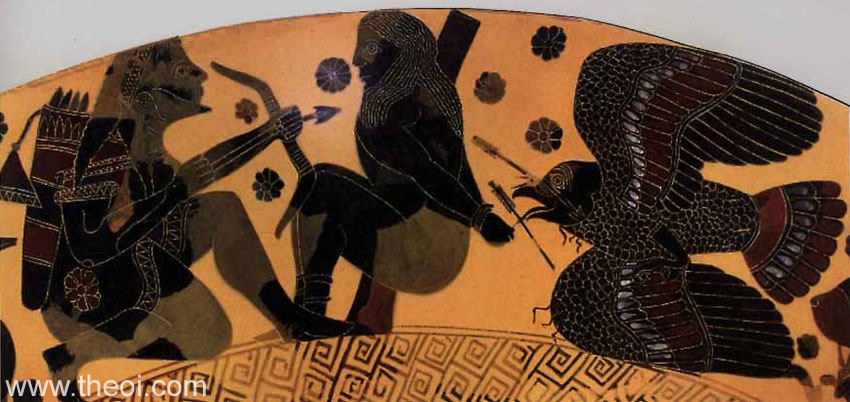
Diodorus Siculus, Library of History 4. 15. 2 (trans. Oldfather) (Greek historian
C1st B.C.) :
"And Zeus, when Prometheus had taken fire and given it to men, put him in chains and set an eagle at his
side which devoured his liver. But when Herakles saw him suffering such punishment because of the benefit which
he had conferred upon men, he killed the eagle with an arrow."
Pausanias, Description of Greece 5. 11. 6 (trans. Jones) (Greek travelogue C2nd A.D.)
:
" [Amongst the objects dedicated in the temple of Zeus at Olympia :] At Olympia there are screens
constructed like walls which keep people out. Of these screens . . . parts show pictures by Panainos (Panaenus).
Among them is . . . Prometheus still held by his chains, though Herakles has been raised up to him. For among
the stories told about Herakles is one that he killed the eagle which tormented Prometheus in the Kaukasos
(Caucasus), and set free Prometheus himself from his chains."
Quintus Smyrnaeus, Fall of Troy 5. 334 ff (trans. Way) (Greek epic C4th A.D.)
:
"[Prometheus] endured all pangs he merited, when, deep-burrowing, the Eagle tare his liver aye
renewed!"
Quintus Smyrnaeus, Fall of Troy 6. 269 ff :
"Herakles, rending Prometheos' (Prometheus') chains, and hurling them this way and that with fragments of
the rock whereinto they were riveted, set free the mighty Titan. Arrow-smitten lay the Eagle of the Torment
there beside."
Quintus Smyrnaeus, Fall of Troy 10. 190 ff :
"[Amongst the scenes depicted on the quiver of Herakles :] There was the Titan Iapetos' great son
[Prometheus] hung from the beetling crag of Kaukasos (Caucasus) in bonds of adamant, and the Eagle tare his
liver unconsumed--he seemed to groan!"
Pseudo-Hyginus, Fabulae 31 (trans. Grant) (Roman mythographer C2nd A.D.) :
"The shining Eagle which was eating out the heart of Prometheus he [Herakles] killed with his arrows."
Pseudo-Hyginus, Fabulae 54 :
"Hercules was sent to kill the Eagle which was eating out Prometheus' heart. When it was killed, Prometheus
after thirty thousand years was freed from Mount Caucasus."
Pseudo-Hyginus, Fabulae 144 :
"Mercurius [Hermes], at Jove's [Zeus'] command, bound him [Prometheus] with iron spikes to a cliff on Mount
Caucasus, and set an Eagle to eat out his heart; as much as it devoured in the day, so much grew again at night.
After 30,000 years Hercules killed this eagle and freed Prometheus."
Pseudo-Hyginus, Astronomica 2. 15 :
"[Constellation] Arrow. This arrow, they say, is one of the weapons of Hercules, with which he is said to
have killed the Eagle which ate the liver of Prometheus . . .
Prometheus he [Zeus] bound with an iron chain to a mountain in Scythia named Caucasus for thirty thousand years,
as Aeschylus, writer of tragedies, says. Then, too, he sent an Eagle to him to eat out his liver which was
constantly renewed at night. Some have said that this eagle was born from Typhon and Echidna, other from Terra
(Earth) [Gaia] and Tartarus, but many point out it was made by the hands of Vulcanus [Hephaistos (Hephaestus)]
and given life by Jove [Zeus] . . . But to come back to the beginning of the inquiry and the death of the eagle.
Hercules, when sent by Eurystheus for the apples of the Hesperides, out of ignorance of the way came to
Prometheus, who was bound on Mount Caucasus, as we have shown above. When victor, he returned to Prometheus to
tell him that that Draco (Dragon) we have mentioned was slain, and to thank him for his kindness since he had
pointed out the way. Straightway he gave what honour he could to the one that deserved it, for he killed the
eagle and since it was slain, men began, when victims were sacrificed, to offer livers on the altars of the gods
to satisfy them in place of the liver of Prometheus."
Virgil, Georgics 6. 41 ff (trans. Fairclough) (Roman bucolic C1st B.C.) :
"Then he [the poet Orpheus] sings . . . of Caucasian eagles, and the theft of Prometheus.”
Propertius, Elegies 2. 1 (trans. Goold) (Roman elegy C1st B.C.) :
"Release Prometheus' arms from his crag on the Caucasus and drive the Vulture away from the middle of his
breast."
Seneca, Hercules Furens 1206 ff (trans. Miller) (Roman tragedy C1st A.D.)
:
"[Herakles, inflicted with madness, cries out :] ‘Let the Caspian crags claim my fettered body, and
let the ravenous bird--Why are Prometheus' crags unoccupied? Why, the bare, steep side of Caucasus which, on its
lofty summit, feeds beasts and birds of prey?’"
Valerius Flaccus, Argonautica 4. 60 ff (trans. Mozley) (Roman epic C1st A.D.)
:
"From the crags and amidst the very ravening of the dreadful Vulture, Prometheus too himself besets Jove
[Zeus] with groans and piteous pleas, uplifting eyes that the cruel frosts have seared; the rivers and rocks of
Caucasus redouble the loud complaint; the Bird itself is amazed at the clamour of the god . . . He [Zeus] moved
by the goddesses' [Artemis and Leto's] tears and Phoebus' [Apollon's] high renown sends down swift Iris on her
rosy cloud. ‘Go,&esquo; he says, ‘let Alcides [Herakles] put off the Phrygians and the war of Troy
[to which he was heading]. Now let him rescue the Titan from the dreadful Bird.’"
Valerius Flaccus, Argonautica 5. 155 ff :
"His [Herakles'] comrades [the Argonauts] proceed upon their way; only they wonder from the deep at the
wide-flung snow that strews the beaches [i.e. that was cast from the Kaukasos (Caucasus) Mountains when Herakles
freed Prometheus from his bonds], at the cloven crags and the huge shadow of a dying bird [the Eagle slain by
Herakles] above them and the gory dew that drizzles through the air."
Valerius Flaccus, Argonautica 7. 352 ff :
"She [the witch Medea] girds up her robe and takes forth a Caucasian herb, of potency sure beyond all
others, sprung of the gore that dropped from the liver of Prometheus, and grass wind-nurtured, fostered and
strengthened by that blood divine among snows and grisly frosts, when the Vulture rises from his feasting on the
flesh and from his open beak bedews the cliffs."
ANCIENT GREEK ART
SOURCES
GREEK
- Hesiod, Theogony - Greek Epic C8th - 7th B.C.
- Aeschylus, Prometheus Bound - Greek Tragedy C5th B.C.
- Aeschylus, Fragments - Greek Tragedy C5th B.C.
- Apollodorus, The Library - Greek Mythography C2nd A.D.
- Apollonius Rhodius, The Argonautica - Greek Epic C3rd B.C.
- Callimachus, Fragments - Greek Poetry C3rd B.C.
- Diodorus Siculus, The Library of History - Greek History C1st B.C.
- Pausanias, Description of Greece - Greek Travelogue C2nd A.D.
- Quintus Smyrnaeus, Fall of Troy - Greek Epic C4th A.D.
ROMAN
- Hyginus, Fabulae - Latin Mythography C2nd A.D.
- Hyginus, Astronomica - Latin Mythography C2nd A.D.
- Virgil, Georgics - Latin Bucolic C1st B.C.
- Propertius, Elegies - Latin Elegy C1st B.C.
- Seneca, Hercules Furens - Latin Tragedy C1st A.D.
- Valerius Flaccus, The Argonautica - Latin Epic C1st A.D.
BIBLIOGRAPHY
A complete bibliography of the translations quoted on this page.
